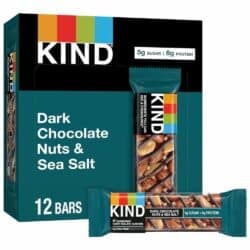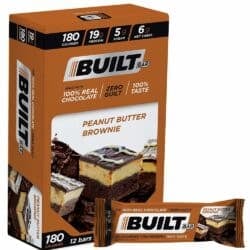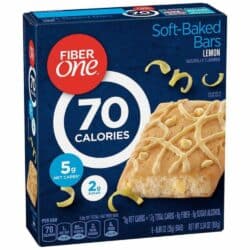Are Quest Bars Healthy (Nutrition Pros and Cons)?
In this blog post, I’ll review the question of whether Quest Bars are healthy or not. Find out this product’s nutrition pros and cons and some better options you can consider.

Quest Bar Facts
Tom Bilyeu, Ron Penna, and Mike Osborn launched Quest in 2010. They created their first protein-packed nutrition bars based on a recipe created by Penna’s wife, Shannan Penna, a fitness trainer. Their idea was to make bars for the fitness industry and fitness enthusiasts.
Today, the company markets its bars as a protein-forward food everyone can enjoy, along with the protein bar minis, protein chips, cheese crackers, protein cookies, frosted cookies, candy, hero bars, protein shakes, protein powders, pizzas, and variety packs.
The bars are available in various flavors and combinations and contain ingredients like milk protein, whey protein, nuts, and fruit.
Each bar has between 18g and 21g of protein, 1g and 2g of sugar, and 8g and 15g of fiber. You can find the products in grocery stores and online.
The bars are generally available in these flavor combinations:
- Pumpkin Pie
- Peppermint Bark
- Dipped Cookies & Cream
- Chocolate Chip Cookie Dough
- Oatmeal Chocolate Chip
- Chocolate Peanut Butter
- S’Mores
- White Chocolate Raspberry
- Dipped Chocolate Chip Cookie Dough
- Cookies & Cream
- Caramel Chocholate Chunk
- Lemon Cake
- Chocolate Brownie
- Chocolate Spinkled Doughnut
- Mint Chocolate Chunk
- Birthday Cake
- Blueberry Muffin
- Double Chocolate Chunk
Quest Bars Ingredients
Common ingredients in Quest Protein Bars include a protein blend of milk protein isolate and whey protein isolate. The ingredient list for the bars vary between the different flavors.
Even though the bars are low in sugar and contain no added sugar, they have some ingredients that may have negative consequences for your health, such as polydextrose and palm kernel oil.
Quest Bars also contain allergens such as nuts and dairy. Let’s take a closer look at some of the ingredients in Quest Bars and what they might mean for your health.
Protein Blend Ingredients
Whey Protein Isolate

The bars contain milk protein isolate, a highly processed protein source. Manufacturers make whey protein by removing the non-protein components from milk to create a high-protein product.
Because of the heavy processing, whey protein isolate contains low to no lactose. Despite this, some people, especially people sensitive to dairy, experience digestive issues when they consume whey protein.
In addition to the possible digestive side effects of consuming whey protein isolate, it’s important to note that studies linked whey protein to potential adverse effects on liver and kidney function.
Milk Protein Isolate
Milk protein isolate is a protein supplement made from skim milk. Food manufacturers including often add milk protein isolate to protein food products like protein bars and shakes as a cost-effective way to increase the protein content without affecting the product’s flavor.
Although, similar to whey protein isolate, there is very little lactose in milk protein isolate (around 1% to 3%), it still contains lactose, and people who are lactose intolerant or sensitive may experience side effects.
Consuming milk protein isolate in large amounts may cause digestive issues such as cramping, bloating, gas, and nausea in some people.
This ingredient is also not appropriate for anyone who has a milk allergy or milk sensitivity.
Palm Kernel Oil

Quest Bars contain palm kernel oil.
Most seed oils, especially palm kernel oil, are highly processed and usually hydrogenated to increase the oil’s shelf life. However, hydrogenation can also cause an increase in trans fats, which may contribute to raised LDL cholesterol levels – the bad kind of cholesterol.
It is important to note that according to the World Wildlife Fund (WWF), palm oil leads to the deforestation of some of the most biodiverse forests on the planet, destroying the habit of endangered species such as pygmy elephant, orangutan, and Sumatran rhino, and contributing to increased greenhouse gases.
In addition to these problems, the harvesting of palm kernel oil often involves unethical practices, including the exploitation of workers and child labor.
See my Yasso Bar Review, a product that also contains palm oil.
Erythritol and Stevia Extract
Erythritol
Quest Bars contain Erythritol, a sugar alcohol that has zero calories and no nutritional value. This sugar alcohol generally does not affect glucose or insulin levels and occurs naturally in some foods. It is a by-product of wheat or corn starch fermentation.
Research has revealed that consuming sugar alcohols like Mannitol, Sorbitol, Xylitol, and Erythritol can cause digestive issues like bloating, gas, and cramping and can even cause laxative problems in people.
Although there is some research claiming that Erythritol is a much better sugar alcohol, it also depends on how sugar alcohols will affect your digestive system.
Stevia Leaf Extract

Stevia Leaf Extract is up to 400 times sweeter than regular sugar, but generally doesn’t affect blood sugar levels.
Although it is a processed non-nutritive sweetener, it may have some health benefits. For example, Stevia Leaf Extract may help lower cholesterol, and some research indicates it may help combat certain types of cancer.
However, research shows that Stevia Leaf Extract may adversely affect your health. One study found that even consuming small amounts of Stevia Leaf Extract may disrupt the gut microbiome. Additionally, people who are sensitive to sugar alcohols could experience digestive distress.
Natural Flavors
When it comes to the term “natural flavors” in food labeling, there is a lot of conflicting information on what it means. The food industry has no official definition; food manufacturers can use it to describe any food product ingredient or additive.
Notably, some natural flavors use artificial processes such as solvents and high heat to extract the flavor enzymes. Unless a food manufacturing company reveals its production methods, it’s impossible to know whether the term “natural flavors” used in the food product are healthy or contain any nutritional value.
You might also like my article on why Pure Protein Bars Are Bad For You.
Polydextrose
Quest Bars contain polydextrose, a complex carbohydrate made from glucose. Although it is impossible to digest, this ingredient is valuable as a prebiotic that feeds good bacteria in the colon.
Polydextrose is an additive, and according to some health sites, it can cause digestive issues like gas, bloating, and diarrhea in some people.
Sucralose
Some Quest Bar flavors contain sucralose. Sucralose is a highly processed, zero-calorie artificial sweetener the human body can’t metabolize. Although it is FDA-approved, sucralose is a controversial ingredient that health-conscious people may want to avoid.
Research has shown that regularly having sucralose over time can cause major long-term health implications, including inflammation that may lead to diabetes and obesity.
Sucralose also lowers the good bacteria needed for the gut to function correctly, so it may harm the gut microbiome. It’s best to apply caution when consuming sucralose and to avoid using it over the long term.
Nutrition Pros
Quest Bars contain protein and fiber, which helps keep you feeling full and staying full longer without needing to reach for a snack as often.
These bars are also a low-sugar and no added sugar option for people who want less sugar in their daily diet. Quest Bars can be a convenient snack with protein and fiber and come in various flavors.
For most people, consuming a Quest Bar will be healthier than eating a candy bar.
Nutrition Cons
Quest Bars are highly processed snack bars that contain dairy and nuts, two of the most common allergens. These bars are unsuitable for people who are allergic or have sensitivities to these ingredients.
Although these bars are low in sugar and high in fiber, they contain some ingredients that health-conscious people may consider unhealthy, for example, palm kernel oil, milk protein isolate, whey protein isolate, and sugar alcohols.
These ingredients may also cause health problems in people with sensitivities or allergies. Instead of purchasing a highly processed snack bar like Quest Bars, make your own healthier and less expensive version at home with real food ingredients.
For instance, you could make my recipe for Peanut Butter Oatmeal Bars and include a scoop of healthy protein powder to increase the protein content. This would be a great whole foods option for a homemade nutrition bar that has 5 grams of protein per serving (more if you add protein powder to the recipe).
Or, try one of these gluten-free packaged snacks if you don’t have time to buy your own.
Lastly, Quest Bars are not organic which means that the ingredients may not be free from pesticides or herbicides.
Nutrition FAQs
Yes, there is a risk of side effects. People who are lactose intolerant or have nut allergies may have adverse effects consuming Quest Bars. Those sensitive to sugar alcohols like stevia or erythritol may have digestive issues.
Also, even though Quest Bars are marketed as being gluten-free, they have a cross-contamination warning on the ingredient label as being processed in a facility that handles wheat, peanuts, and other tree nuts.
Quest Bar flavors contain non-calorie artificial sweeteners like sucralose and sugar alcohols like stevia and Erythritol. Although these ingredients are used as sugar substitutes, they may not be healthy, especially if consumed long-term. If you are sensitive or allergic to dairy or nuts, it is best to avoid consuming Quest Bars.
Teenagers who have allergies to dairy or nuts should avoid eating Quest Bars. Although these bars are high in protein and fiber and low in sugar, they are processed and not the healthiest choice. If teenagers choose to have Quest bars, they should do so in moderation.
Don’t Miss These Bar Reviews!
Conclusions
Quest Bars are high in protein and fiber and are low in sugar, but they are not the best snack for health-conscious people. They contain highly processed ingredients and allergens.
Don’t forget to join my newsletter list to get exclusive clean eating recipes and tips. The newsletter is 100% free with no spam; unsubscribe anytime.
About the Author: Carrie Forrest has a master’s degree in public health with a specialty in nutrition and is studying to be a holistic nutritionist. She is a top wellness and food blogger with over 5 million annual visitors to her site. Carrie has an incredible story of recovery from chronic illness and is passionate about helping other women transform their health. Send her a message through her contact form.
Note: this post is for informational purposes only and is not intended as medical advice. Please consult your healthcare provider for recommendations related to your individual situation.





















Your post tells you basically the quest bars are not a healthy choice. But you don’t say what snacks that are out there that do give you high protein and high fiber content are a good choice other than a recipe that you have to cook it. Many people do not cook or do not have the time to put into cooking things like that so it would be nice if your post gave other options to the quest bar That we could purchase at a store
Great point, I’ve added the link to this post that has favorite packaged snacks: https://theglowandglowclub.com/clean-eating-healthy-travel-snacks/